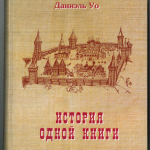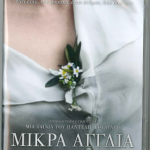Istorii︠a︡ odnoĭ knigi : Vi︠a︡tka i “ne-sovremennostʹ” v russkoĭ kulʹture petrovskogo vremeni / D.K. Uo. (OCLC #52977300)
When American authors write books in different languages (and alphabets), their name may appear on the piece in a different form, which is what is transcribed into the statement of responsibility:
245 10 ǂa Istorii︠a︡ odnoĭ knigi :ǂb Vi︠a︡tka i "ne-sovremennostʹ" v russkoĭ kulʹture
petrovskogo vremeni / ǂc D.K. Uo.
The more common (authorized) form of the author’s name is also recorded as an access point:
100 1_ ǂa Waugh, Daniel Clarke.
At the BIBFRAME meeting, we discussed: why do we do both a transcribed version and a link to an access point for only some fields (title, author, subject) and not others (place of publication, publisher). My theory is that it is habit: in card catalogs, we didn’t have “publisher” cards, so there was no reason to record what would be a “heading” for those cards. Would those headings/links be useful now?

